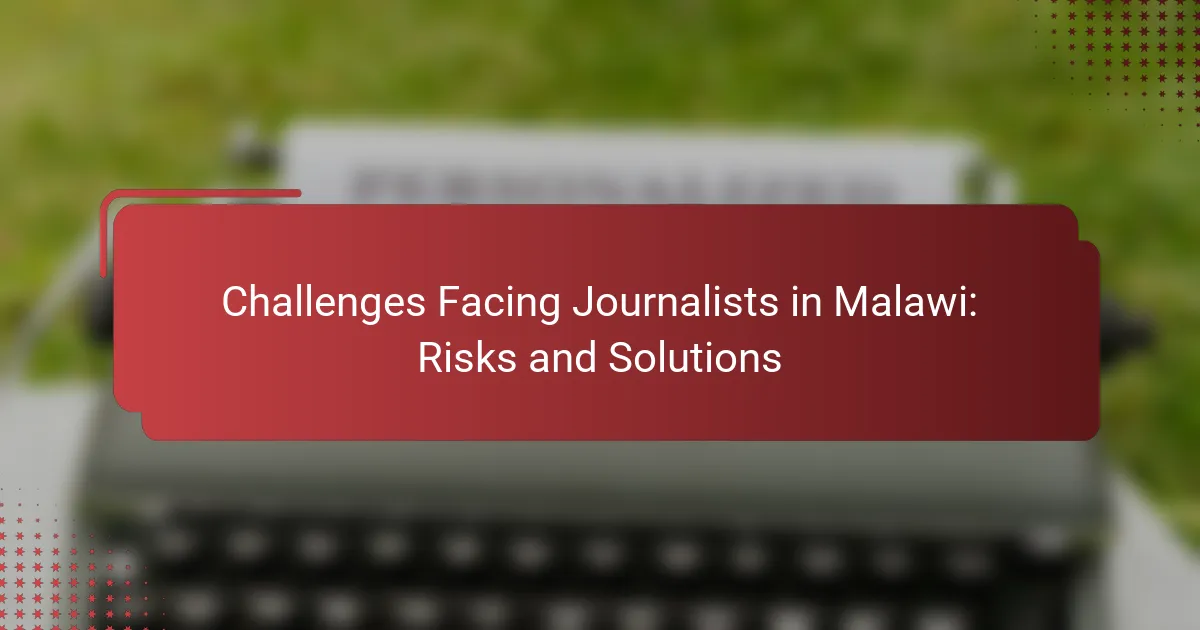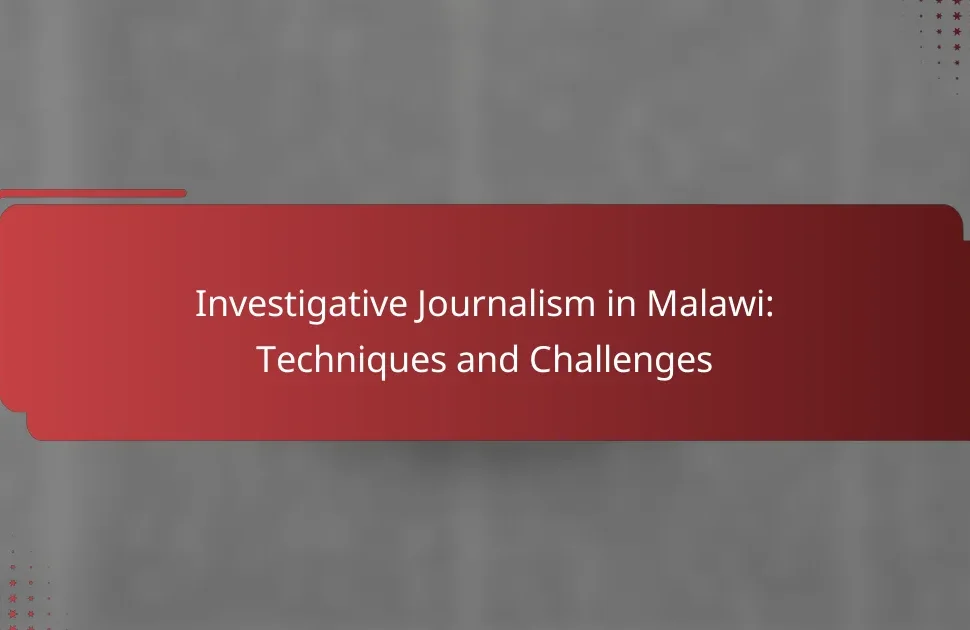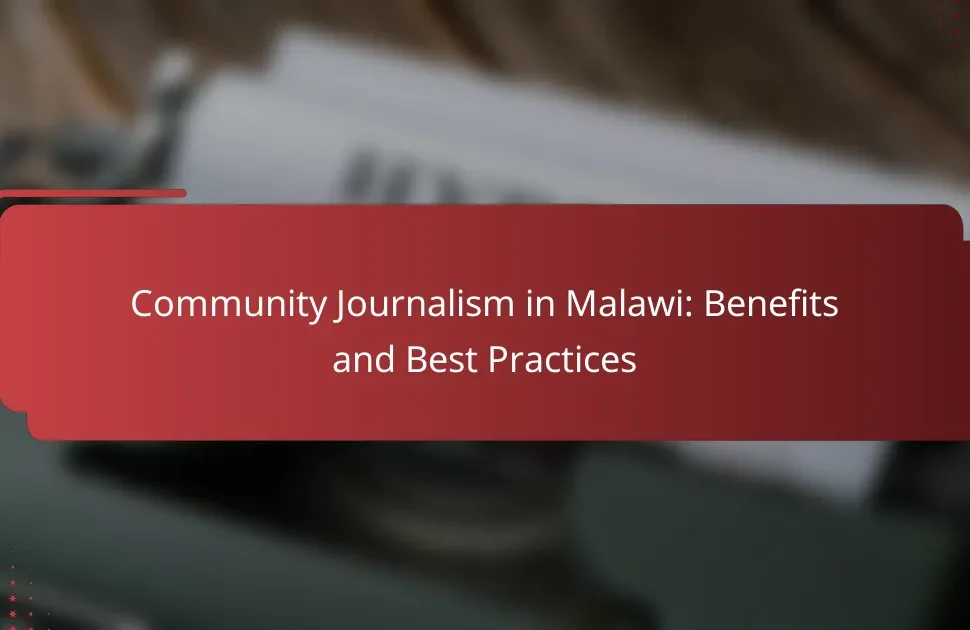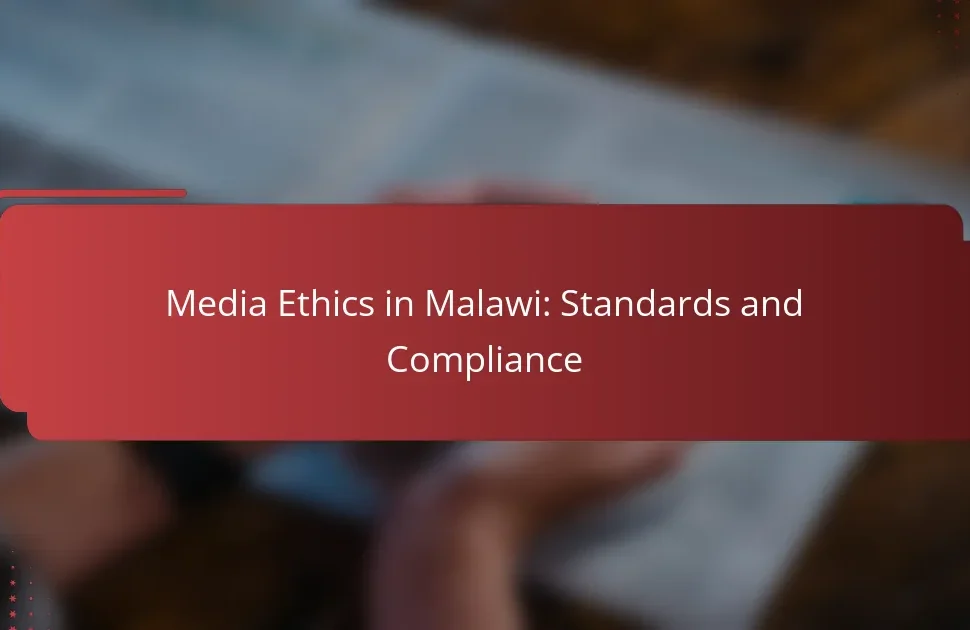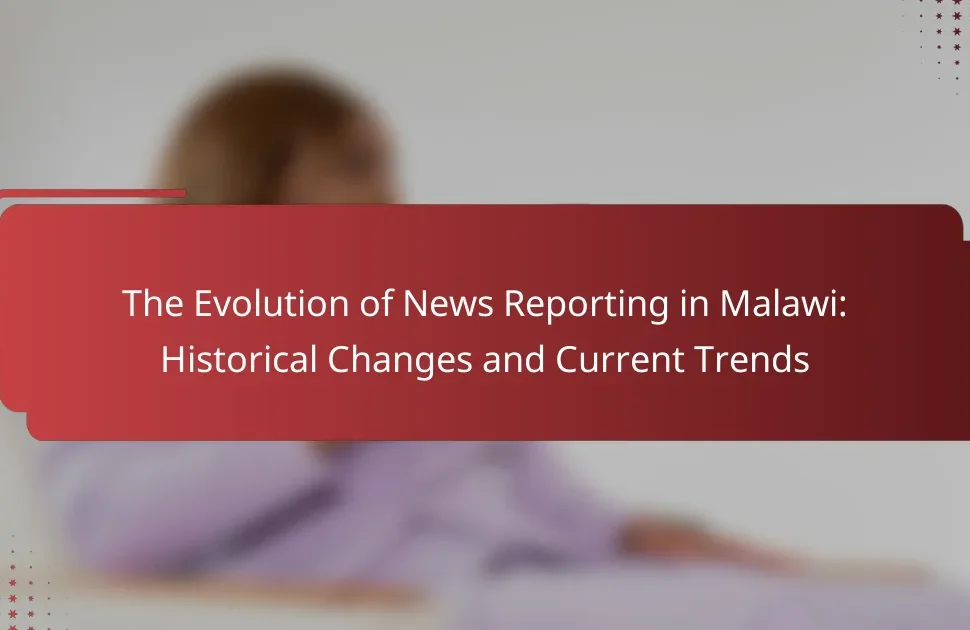The article addresses the challenges faced by journalists in Malawi, highlighting issues such as government censorship, limited resources, and threats to safety. It outlines how these challenges restrict press freedom and hinder investigative journalism, with journalists experiencing harassment and intimidation, particularly from political entities. The article also discusses potential solutions, including enhancing legal protections, providing training programs, and increasing funding for independent media outlets. Overall, it emphasizes the need for a safer and more supportive environment for journalists to effectively report on critical issues in Malawi.
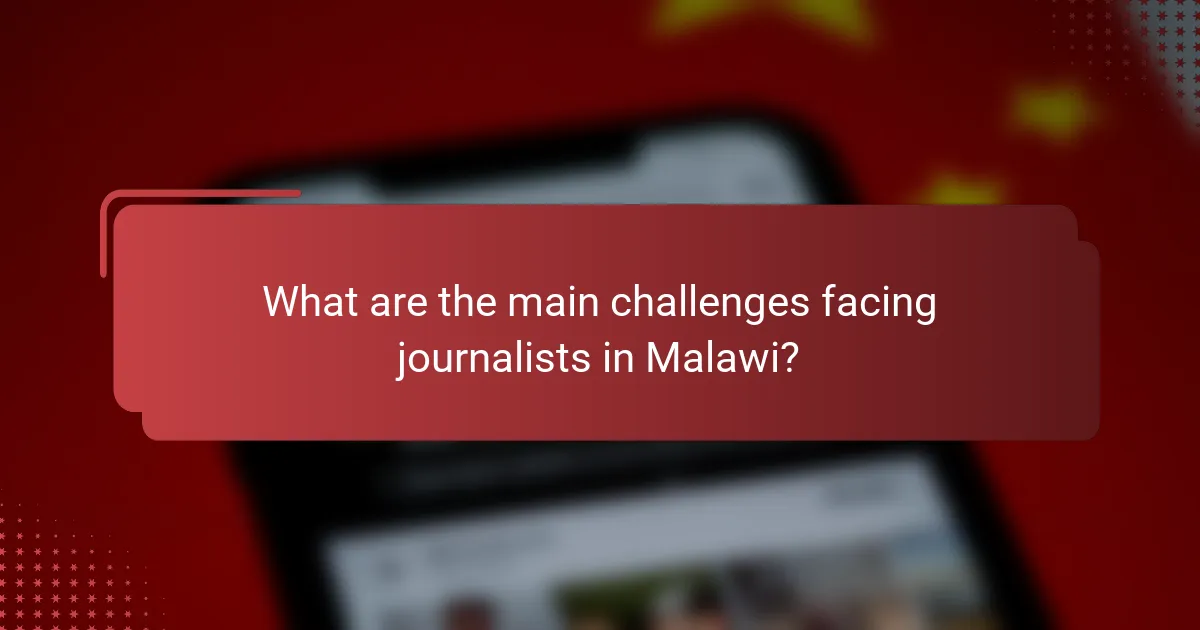
What are the main challenges facing journalists in Malawi?
The main challenges facing journalists in Malawi include government censorship, limited resources, and threats to safety. Government censorship restricts press freedom, impacting the ability to report freely. Limited resources hinder investigative journalism due to a lack of funding and equipment. Additionally, threats to safety arise from political tensions, leading to harassment and intimidation of journalists. According to the 2022 World Press Freedom Index, Malawi ranks 75th out of 180 countries, indicating ongoing challenges in media freedom.
How do political factors impact journalism in Malawi?
Political factors significantly impact journalism in Malawi by influencing press freedom and media operations. Government policies can restrict journalists’ ability to report freely. For instance, laws like the Access to Information Act aim to improve transparency but are often inadequately enforced. Political pressure can lead to self-censorship among journalists, fearing repercussions from authorities. Additionally, political affiliations of media outlets can shape coverage, often prioritizing government narratives. The 2019 elections highlighted how political tensions can escalate threats against journalists. Reports indicate that journalists faced harassment and intimidation during this period. Overall, the political climate in Malawi creates a challenging environment for journalistic integrity and freedom.
What specific political pressures do journalists encounter?
Journalists in Malawi encounter several specific political pressures. These pressures include government censorship, which restricts the freedom of the press. Journalists may face intimidation from state authorities aiming to control the narrative. Additionally, there are threats of violence against reporters who criticize the government. Economic pressures also exist, as media outlets may be financially dependent on government advertising. This can lead to biased reporting in favor of the government. Furthermore, legal challenges, such as defamation laws, can be used to silence dissenting voices. These factors create a hostile environment for journalistic integrity and independence in Malawi.
How does government censorship affect reporting?
Government censorship significantly restricts reporting by limiting access to information. Journalists face challenges in covering critical issues due to imposed restrictions. This can lead to self-censorship, where reporters avoid sensitive topics to evade repercussions. The lack of transparency hampers the public’s right to know. In Malawi, instances of government censorship have been documented, affecting the credibility of news outlets. According to a 2020 report by Freedom House, press freedom in Malawi is under threat due to government interference. Censorship can also result in a homogenization of news, reducing diversity in perspectives. Ultimately, government censorship undermines the role of journalism in a democratic society.
What role does economic instability play in journalistic challenges?
Economic instability significantly exacerbates journalistic challenges. It leads to reduced funding for media organizations, resulting in layoffs and diminished resources. Journalists often face increased pressure to produce content quickly, compromising quality. Economic constraints limit investigative journalism due to the high costs involved in research and reporting. Additionally, economic instability can lead to censorship and self-censorship as media outlets fear losing advertisers or funding. In Malawi, the economic situation has led to a reliance on government subsidies, which can compromise editorial independence. A study by the International Federation of Journalists highlights that economic downturns directly correlate with declines in press freedom and journalistic integrity.
How does funding affect media operations in Malawi?
Funding significantly affects media operations in Malawi by determining the resources available for journalism. Limited funding restricts the ability to hire skilled professionals and invest in technology. This often results in lower quality reporting and reduced investigative journalism. Additionally, inadequate financial support can lead to media outlets relying on government or corporate sponsorships, which may compromise editorial independence. According to a report by the Media Institute of Southern Africa, many Malawian media organizations struggle with financial sustainability, impacting their capacity to provide unbiased news. This financial strain also affects the diversity of voices represented in the media landscape. Overall, funding plays a crucial role in shaping the effectiveness and integrity of media operations in Malawi.
What are the implications of economic constraints on journalistic integrity?
Economic constraints significantly undermine journalistic integrity. Limited funding often leads to reduced investigative reporting and reliance on less credible sources. Journalists may prioritize sensationalism over accuracy to attract readership. Economic pressures can also result in self-censorship due to fear of losing financial support. A study by the International Federation of Journalists highlights that financial instability compromises ethical standards. This creates a cycle where quality journalism suffers, impacting public trust. In Malawi, these constraints are exacerbated by a struggling economy and limited resources.
How do social factors influence the safety of journalists?
Social factors significantly influence the safety of journalists. These factors include societal attitudes towards media, political climate, and community support. In contexts where hostility towards the press exists, journalists face increased risks. For instance, in Malawi, journalists often encounter threats and violence due to negative public sentiment. Additionally, social networks can either protect or expose journalists to danger. Supportive communities may offer protection, while divisive social dynamics can lead to isolation. Reports indicate that journalists working in hostile environments are more likely to experience harassment. Understanding these social dynamics is crucial for addressing the safety challenges faced by journalists.
What risks do journalists face from local communities?
Journalists in Malawi face various risks from local communities. These include threats of violence and harassment. Community members may perceive journalists as outsiders or adversaries. This can lead to hostility, particularly when reporting on sensitive issues. Additionally, journalists may face social ostracism for their work. In some cases, local authorities may pressure communities to silence journalists. According to a report by the Committee to Protect Journalists, such risks can deter investigative reporting. These challenges hinder journalistic freedom and the dissemination of information.
How does public perception of journalists affect their work?
Public perception of journalists significantly impacts their work. Negative perceptions can lead to distrust and hostility towards journalists. This environment may hinder journalists’ ability to report freely. For example, journalists in Malawi face threats and violence due to public skepticism. A study by the Media Institute of Southern Africa found that 63% of Malawians believe journalists are biased. This belief can result in self-censorship among journalists. Consequently, they may avoid controversial topics to maintain public favor. Overall, public perception shapes the safety, freedom, and effectiveness of journalistic work.
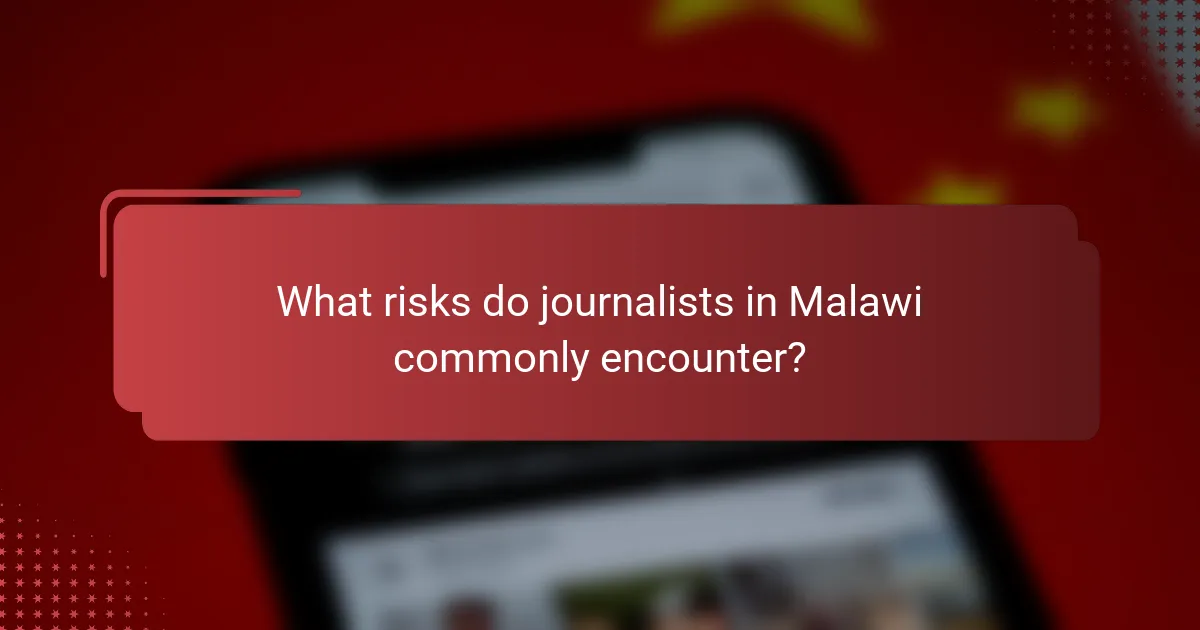
What risks do journalists in Malawi commonly encounter?
Journalists in Malawi commonly encounter risks such as harassment, intimidation, and violence. These threats often stem from government officials and political entities. Journalists face legal challenges, including censorship and restrictions on press freedom. According to the Committee to Protect Journalists, Malawi has seen an increase in attacks on reporters covering sensitive topics. Additionally, journalists may experience threats to their safety while reporting in conflict-prone areas. Economic instability further exacerbates these risks, limiting resources for protective measures. The environment for journalists remains precarious, impacting their ability to report freely and safely.
What physical threats do journalists face in the field?
Journalists face various physical threats in the field, including violence, harassment, and armed conflict. Violence can come from state actors, non-state groups, or even civilians. Harassment may involve intimidation or physical assaults aimed at silencing reporting. Armed conflict poses a significant risk, especially in regions experiencing war or civil unrest. According to the Committee to Protect Journalists, 2021 saw a record number of journalists killed while on the job. These threats can deter journalists from covering critical issues, impacting press freedom and public awareness.
How prevalent are attacks on journalists in Malawi?
Attacks on journalists in Malawi are relatively prevalent. Reports indicate that journalists face harassment, intimidation, and physical violence. According to the Committee to Protect Journalists, there have been multiple incidents of threats against media professionals in recent years. In 2020, a journalist was assaulted while covering a protest. Such incidents create a hostile environment for press freedom. The Malawi Human Rights Commission has also documented these attacks, highlighting the need for protective measures. Overall, the situation poses significant risks for journalists operating in the country.
What measures can journalists take to protect themselves physically?
Journalists can take several measures to protect themselves physically. They should conduct thorough risk assessments before reporting in potentially dangerous areas. Carrying safety equipment, such as helmets and body armor, is essential for protection during conflict situations. Maintaining a low profile and avoiding confrontation can reduce the likelihood of danger. Journalists should also establish a communication plan with their news organization for regular check-ins. Training in self-defense and first aid can be beneficial. Additionally, collaborating with local journalists can provide valuable insights into the environment and potential risks. These measures are supported by safety protocols recommended by organizations like the Committee to Protect Journalists.
What legal challenges do journalists encounter?
Journalists encounter various legal challenges, including censorship, defamation laws, and restrictions on freedom of information. In Malawi, laws can limit press freedom and impose penalties for reporting on sensitive topics. Journalists may face lawsuits for defamation, which can deter critical reporting. Additionally, government regulations can restrict access to information, impacting investigative journalism. The legal environment can create a climate of fear, inhibiting journalists from pursuing stories. According to the Committee to Protect Journalists, legal threats remain a significant risk for media professionals globally, including in Malawi.
What are the common legal repercussions for journalists in Malawi?
Common legal repercussions for journalists in Malawi include harassment, arrest, and imprisonment. Journalists can face legal action for defamation, which is often used to silence dissent. Additionally, the Penal Code includes provisions that criminalize false publication and seditious practices. These laws create a chilling effect on press freedom. In some cases, journalists have been charged under laws related to national security. Reports indicate that these legal challenges often lead to self-censorship among media professionals. The Malawi government has been criticized for using these laws to restrict journalistic activities.
How do defamation laws impact journalistic freedom?
Defamation laws significantly restrict journalistic freedom by imposing legal consequences for false statements. Journalists may face lawsuits if they publish information deemed defamatory. This creates a chilling effect, discouraging investigative reporting and critical coverage. In Malawi, defamation laws can lead to heavy fines or imprisonment for journalists. Such risks may result in self-censorship, limiting the scope of reporting. According to a 2021 report by the Media Institute of Southern Africa, many Malawian journalists avoid controversial topics due to fear of legal repercussions. Thus, defamation laws undermine the ability of journalists to hold power accountable.
What psychological effects do these risks have on journalists?
Journalists in Malawi face significant psychological effects due to various risks. These effects include anxiety, depression, and post-traumatic stress disorder (PTSD). Exposure to violence, threats, and harassment can lead to chronic stress. This stress impacts their mental health and job performance. Research indicates that journalists in conflict zones report higher levels of psychological distress. A study by the Committee to Protect Journalists found that 70% of journalists experience anxiety related to their work. Additionally, feelings of isolation and fear can exacerbate these psychological issues. Overall, the risks faced by journalists in Malawi contribute to a detrimental mental health landscape.
How does the stress of reporting in a risky environment affect mental health?
The stress of reporting in a risky environment negatively affects mental health. Journalists often experience anxiety, depression, and post-traumatic stress disorder (PTSD). High-stress situations can lead to burnout and emotional exhaustion. Research indicates that exposure to violence and danger increases psychological distress. A study by the Dart Center for Journalism and Trauma found that journalists in conflict zones report higher rates of mental health issues. Additionally, the lack of support systems exacerbates these problems. In Malawi, journalists face unique challenges that can intensify the stress experienced in their roles.
What support systems are available for journalists dealing with trauma?
Support systems available for journalists dealing with trauma include mental health services, peer support networks, and training programs. Mental health services provide counseling and therapy specifically for journalists. Peer support networks allow journalists to connect with others who have experienced similar traumas. Training programs offer strategies for coping with trauma and building resilience. Organizations like the Committee to Protect Journalists and the International Federation of Journalists provide resources and support. These systems aim to help journalists process their experiences and maintain their mental well-being.
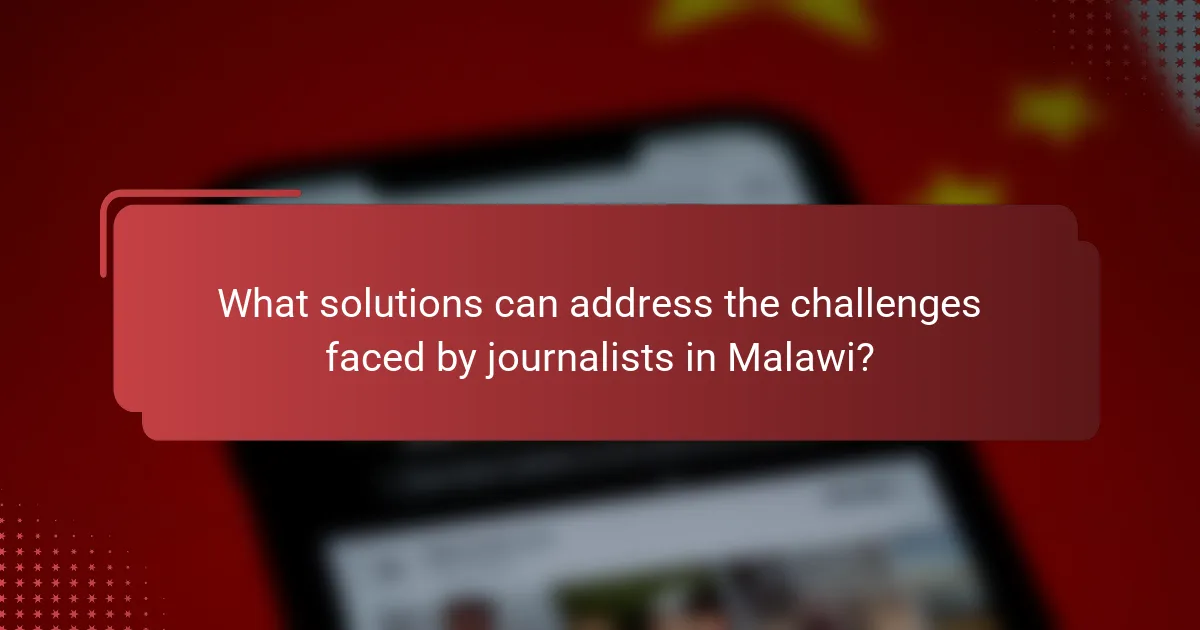
What solutions can address the challenges faced by journalists in Malawi?
Solutions to address the challenges faced by journalists in Malawi include enhancing legal protections and promoting press freedom. Strengthening laws that protect journalists from harassment and violence is essential. Implementing training programs on ethical reporting can improve journalistic standards. Establishing support networks for journalists can provide resources and assistance during crises. Increasing access to funding and grants can help independent media outlets thrive. Encouraging collaboration among journalists can foster a supportive community. Advocacy from international organizations can apply pressure for reforms. These solutions are vital to ensure a safer and more effective journalistic environment in Malawi.
How can training improve journalist safety and resilience?
Training can significantly enhance journalist safety and resilience. It equips journalists with essential skills to assess risks effectively. Training programs often include safety protocols and situational awareness techniques. These skills help journalists navigate dangerous environments more safely. Furthermore, training fosters mental resilience through stress management techniques. Journalists learn to cope with the psychological demands of their work. Evidence shows that well-trained journalists are less likely to experience trauma. A study by the Committee to Protect Journalists found that safety training reduces incidents of violence against journalists. Overall, comprehensive training is vital for improving safety and resilience among journalists.
What specific skills should be included in safety training programs?
Safety training programs should include skills such as risk assessment, emergency response, and first aid. Risk assessment enables individuals to identify potential hazards in their environment. Emergency response training prepares participants to act swiftly during crises. First aid skills provide essential knowledge to manage medical emergencies. Communication skills are also crucial for reporting incidents effectively. Personal safety techniques, including situational awareness, help individuals navigate dangerous situations. Conflict resolution skills are important for managing disputes peacefully. Additionally, understanding legal rights and protections is vital for journalists facing threats. These skills collectively enhance safety and preparedness in high-risk environments.
How can mentorship programs support emerging journalists?
Mentorship programs can support emerging journalists by providing guidance and networking opportunities. They connect novices with experienced professionals in the field. This relationship fosters skill development and knowledge sharing. Mentors can offer insights into industry standards and ethical practices. They help mentees navigate challenges specific to journalism in Malawi. Research shows that mentorship improves job performance and confidence among emerging journalists. A study by the International Journal of Journalism highlighted increased career advancement for those with mentors. Thus, mentorship programs are essential for the growth of new journalists in Malawi.
What role do international organizations play in supporting Malawian journalists?
International organizations play a crucial role in supporting Malawian journalists. They provide training and resources to enhance journalistic skills. These organizations advocate for press freedom and the safety of journalists in Malawi. They also offer financial assistance to media outlets facing economic challenges. Reports indicate that organizations like Reporters Without Borders and the Committee to Protect Journalists actively engage in these efforts. Their initiatives aim to strengthen the capacity of journalists and promote ethical reporting. Furthermore, international organizations often collaborate with local entities to address specific challenges faced by journalists in Malawi. This multifaceted support is essential for fostering a vibrant media landscape in the country.
How can partnerships with NGOs enhance journalistic freedom?
Partnerships with NGOs can enhance journalistic freedom by providing resources and support to journalists. NGOs often offer training programs that improve journalistic skills. These programs can include investigative techniques and ethical reporting practices. Additionally, NGOs may provide funding for independent journalism initiatives. This financial support allows journalists to pursue stories without commercial pressures. Furthermore, NGOs can advocate for press freedom and influence policy changes. They often engage in campaigns to protect journalists facing threats or censorship. By working together, NGOs and journalists can create a safer environment for reporting. This collaboration ultimately strengthens the role of journalism in society.
What resources do international bodies provide for journalist safety?
International bodies provide various resources for journalist safety, including training, legal support, and emergency assistance. Organizations like UNESCO and the Committee to Protect Journalists offer safety training programs to equip journalists with skills to navigate dangerous situations. They also provide legal assistance to journalists facing harassment or wrongful imprisonment. Additionally, international bodies often create emergency funds to support journalists in crisis situations. Reports indicate that these resources have helped reduce risks for journalists in conflict zones and oppressive regimes. For instance, in 2020, UNESCO reported a significant increase in safety training sessions globally, highlighting their commitment to journalist protection.
What best practices can journalists adopt to navigate risks effectively?
Journalists can adopt several best practices to navigate risks effectively. First, they should conduct thorough research before reporting. This includes understanding the political, social, and cultural contexts of their stories. Second, journalists must prioritize their safety by developing safety plans. These plans should outline protocols for various scenarios, including threats or hostile environments. Third, building a network of trusted contacts can provide support and information. This network can include local sources, fellow journalists, and legal advisors. Fourth, journalists should stay updated on legal protections and rights. Knowledge of these can help them navigate challenges posed by authorities. Finally, practicing ethical journalism is crucial. Adhering to ethical standards can protect journalists from backlash and enhance their credibility.
How can journalists build a network for mutual support?
Journalists can build a network for mutual support by actively engaging with peers and participating in local media associations. Establishing regular meetups fosters collaboration and knowledge sharing. Utilizing social media platforms enhances connectivity and facilitates discussions. Creating group chats or forums allows for real-time support and information exchange. Participating in training workshops strengthens skills and builds trust among journalists. Collaborating on investigative projects encourages teamwork and resource sharing. These actions lead to a stronger, more resilient journalistic community. Studies show that networks enhance journalists’ safety and effectiveness in challenging environments, such as Malawi.
What strategies can journalists implement to ensure ethical reporting under pressure?
Journalists can implement several strategies to ensure ethical reporting under pressure. First, they should adhere to established ethical guidelines, such as those from the Society of Professional Journalists. These guidelines emphasize truthfulness, accuracy, and fairness. Second, journalists can seek mentorship or guidance from experienced colleagues when facing ethical dilemmas. This collaboration can provide valuable perspectives. Third, maintaining transparency with the audience about the challenges faced during reporting can build trust. Fourth, journalists should prioritize fact-checking, even under tight deadlines, to avoid misinformation. Research indicates that consistent adherence to ethical standards improves public trust in journalism. By employing these strategies, journalists can navigate pressure while upholding their ethical responsibilities.
The main entity of the article is the challenges faced by journalists in Malawi, encompassing various risks and potential solutions. Key issues include government censorship, limited resources, and threats to safety, which significantly hinder press freedom and journalistic integrity. Economic instability further exacerbates these challenges, affecting funding and operational capacity. The article also explores the impact of political factors, social dynamics, and legal challenges on journalists, while proposing solutions like enhanced legal protections, training programs, and support networks to improve the safety and effectiveness of media professionals in Malawi.
